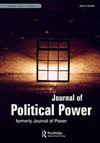Power and politics in public inquiries: bloody sunday 1972
IF 1.3
Q1 POLITICAL SCIENCE
引用次数: 3
Abstract
ABSTRACT What are the dominant framings by which public inquiries understand and analyze power dynamics in the events they examine? We draw on unique data from the Saville Inquiry into the killing of 13 people by British soldiers at acivil rights demonstration in Northern Ireland in 1972. Juxtaposing an analysis of the actions of senior military figures with the final Inquiry report, we show how an approach of ‘sufficient rationalization’ dominated apublic inquiry’s conclusions, marginalizing and discounting important aspects. Emphasizing the local exercise of power and affective attachments, our article contributes an alternative approach to analyzing public inquiries.公众调查中的权力与政治:1972年血腥星期日
摘要公众调查了解和分析所调查事件中的权力动态的主要框架是什么?我们利用了萨维尔调查的独特数据,该调查涉及1972年英国士兵在北爱尔兰的反种族主义权利示威中杀害13人。将对高级军事人物行为的分析与最终调查报告结合起来,我们展示了“充分合理化”的方法如何主导了无意义的调查结论,边缘化和忽视了重要方面。我们的文章强调了权力和情感依恋的地方行使,为分析公众咨询提供了一种替代方法。
本文章由计算机程序翻译,如有差异,请以英文原文为准。
求助全文
约1分钟内获得全文
求助全文

 求助内容:
求助内容: 应助结果提醒方式:
应助结果提醒方式:


